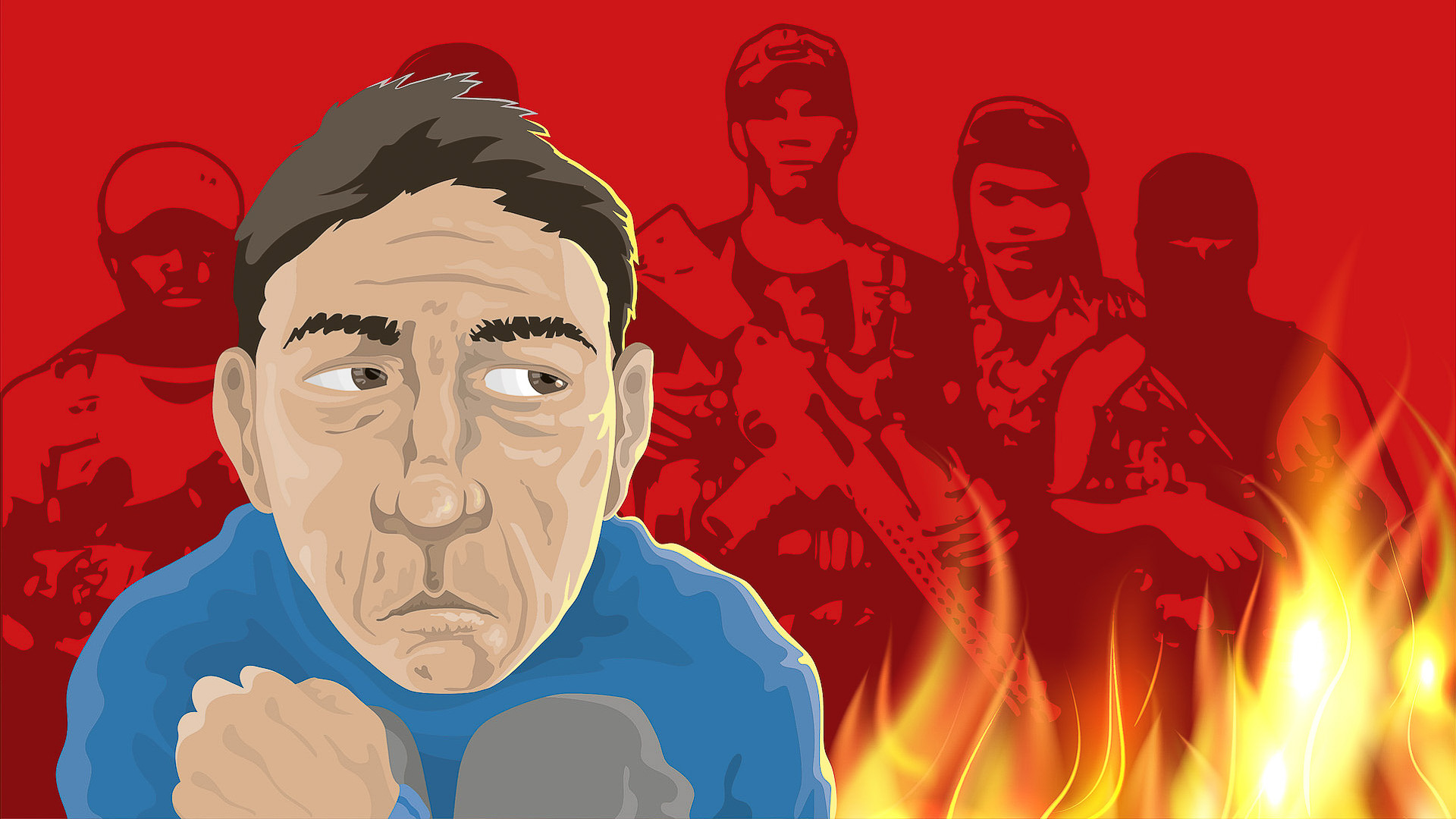

One fine day in 2006, Renzo Salinas was invited to receive training to defend the “process” led by Hugo Chávez. It was four months of training by the Revolutionary Armed Forces of Colombia (FARC) guerrillas in a clandestine camp deep into the bowels of the state of Barinas. Thirteen years later, scarred by disappointment, Salinas tells of about his experience and about everything that he lived through until he became the human rights activist he is today..
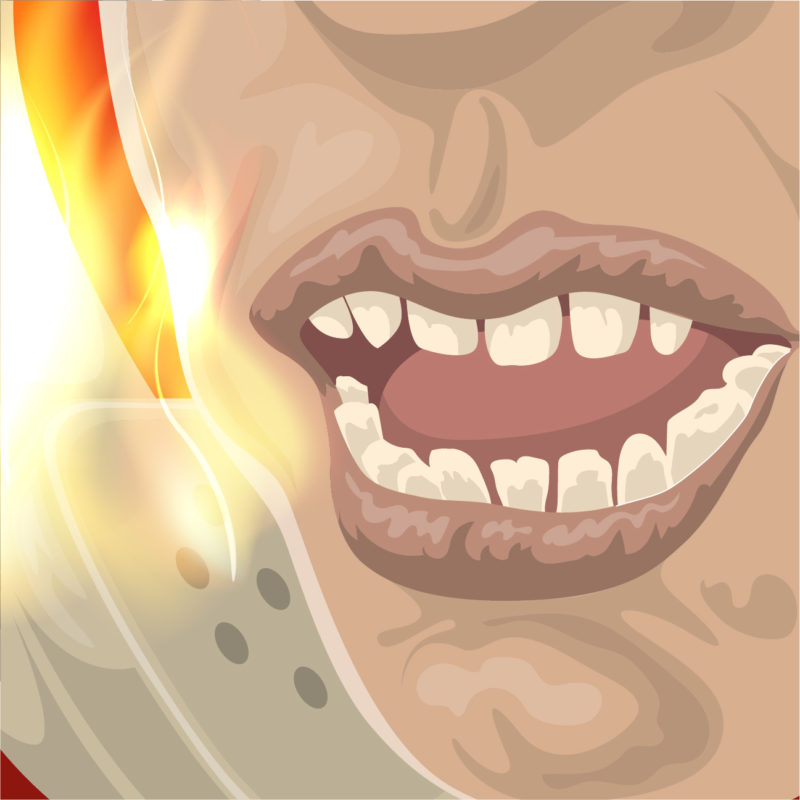 Ilustrations: Walther Sorg
Ilustrations: Walther Sorg
“We are going to show you how to kill rats without leaving a trace.”
That phrase still resounds in my head.
I was once a trusted man for Chavismo. That was what they told me when they invited me to a training camp where I would learn tools to defend the process in Barinas, the state in the plains where I come from and where the mastermind of this so-called revolution was born too.
It all began with the World Social Forum that was held in Caracas in January 2006. Thousands of activists from Venezuela and different parts of the world gathered at the event to discuss ideas around a single question: Is a socialist world possible? At that time, I led a normal life and was a social activist, and I still am. I supported Hugo Chávez because I had always longed for a world of equality and equity, and that was what he proclaimed in those years. I was a parish coordinator of the Fifth Republic Movement (MVR, by its Spanish accronym) in my capacity as vice chair of the state’s confederation of neighbors, and I was also a member of the local public planning council, presided over by Julio César Reyes, the mayor of Barinas. That is why I attended that event with much enthusiasm.
It was shortly after that forum that they began to convene community leaders from the MVR. Trusted people, they insisted. I was one of them. They told us that we needed to be ready to fight. That we should prepare for that.
I accepted, along with about 40 other people. We were instructed to gather in the La Carolina public park, north of Barinas, from which they drove us in a couple of minibuses to Socopó, an hour and a half by road. And from there, we were transported through trails in four-wheel-drive vehicles up to a forest area deep in the Ticoporo Forest Reserve, about 10 miles from Socopó. At the site, they had set up a training camp on a plain. Tents in the middle of nowhere. Nothing around but brush.
We were warmly welcomed with a feast of grilled meat. It was like a family reunion: Zulay Martínez, mayoress of the Andrés Eloy Blanco municipality, as well as renowned political leaders such as Adán Chávez, Luis Miquilena and Pedro Carreño, arrived in other vehicles.
Pedro Carreño, who was then a congressman, was already known to me. I participated in the electoral campaign for the National Assembly, and we had already met before, first in the army —I served in the military from 1987 to 1989—, where he was a lieutenant, and then when I took part in meetings of the Revolutionary Bolivarian Movement-200 (MVR-200), a left-wing movement founded by Hugo Chávez in the barracks.
Other than that first day, I remember seeing him a couple more times in the field. When we bumped into each other and greeted each other, he would say to me:
“Comrade! It’s so good that you’re here; this is very important. I’m going to help you when you complete your training; you will have a house, a car, a job.”
The training coaches were guerrilla men. We knew it, and they never tried to hide it. Those who went to town to run errands dressed as civilians, while others wore olive green uniforms and bracelets from the FARC. There were about 30 of them: approximately 12 were trained us, while the rest watched over us.
It was like being in the barracks. We slept in bunk beds that they had brought in trucks. We woke up very early in the morning to assist in the kitchen, peeling vegetables or carrying water in buckets from a nearby ravine. Then we would work out and take lessons in shooting, self-defense and gun disarming. They also taught us how to extort, how to kidnap, how to follow up people. Everything, they stressed, in order to seize control of the communities. Just like that, plain and simple.
Life in there was not pleasant. Except for some free time to play soccer or dominoes, we used to live under a lot of pressure. They threatened us by saying things like “Don’t you even dare to think about telling your friends or relatives about this, or you will face the consequences and we assure you it will be worse”, or things like “Watch out and don’t mess up with us.”
I was disillusioned and wanted to leave. But I only dared to discuss it with my classmates when several of them began to utter the same words, albeit quietly:
“This is not what they promised us.”
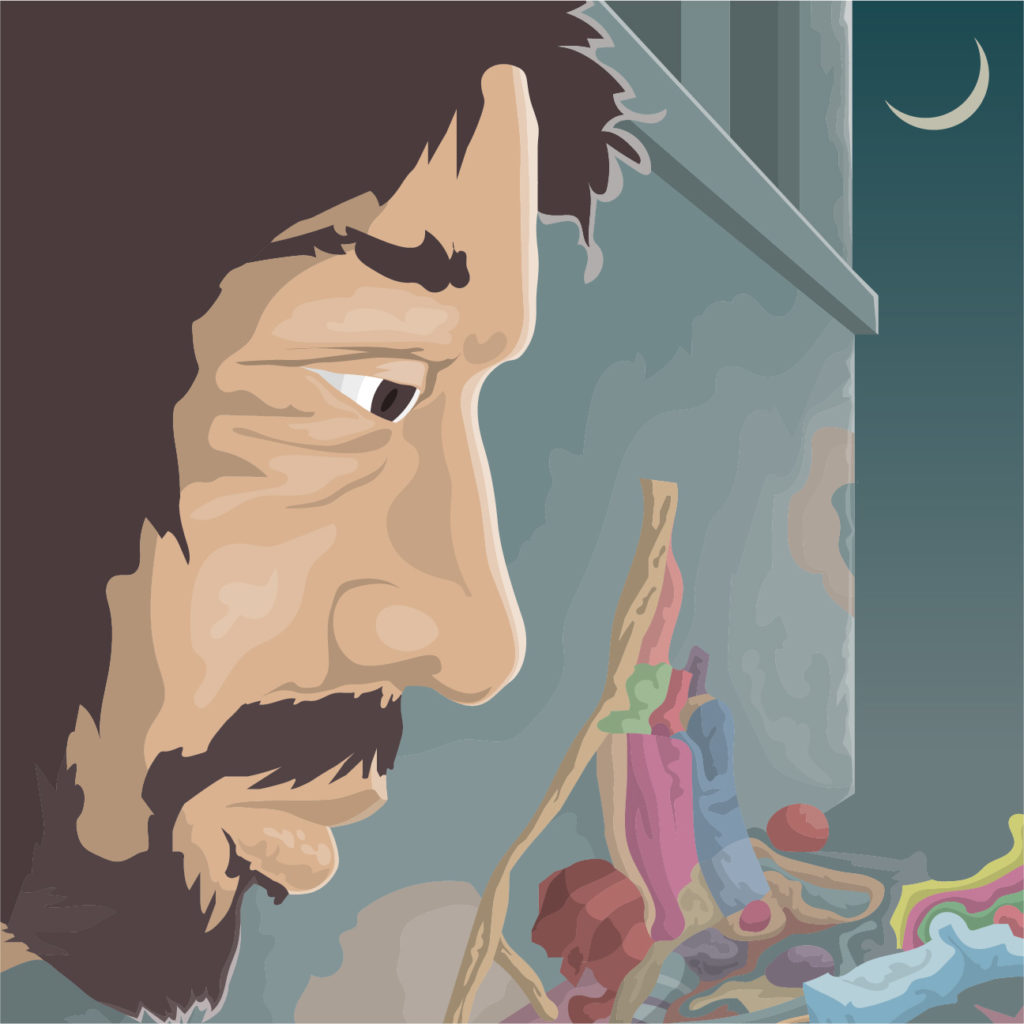
But escaping wasn’t easy.
“You can’t leave here; you know a lot, way too much. We know everything about your families, where they live and who they are,” the guards would warn us.
I was in fear because they were well capable of killing. Part of their plan was to put an end to the rule of criminals in Barinas and, I guess, take it for themselves to be free to extort cattle ranchers and loggers and crush all demonstrations by the opposition. They had a list of the scourges of Socopó and surrounding areas and they would ride their motorcycles at night, wearing hoods, to exterminate them. The next day, to find out what the people were talking about, we would go with them to some bar or chicken joint, all dressed in civilian clothes, where we would eat and drink nonchalantly.
“How many did they kill last night?” one would ask the person sitting next in the bar.
“Yeah, it was pure horror.”
“Who would have been?”
“I don’t know. But those who got killed were good for nothing, a bunch of crooks. We are better off like this.”
Then, in the camp, during training, they would recall those conversations and would tell us:
“See? We’re going to show you how to kill rats without leaving a trace.”
They were on the lookout for what was published in the local press. They bought the newspapers and commented among themselves on the news about their killings. That is how we learned that they had murdered two of our comrades who stole the keys to one of their 4-wheel-drive jeeps and escaped, tired of it all.
“Look at the newspaper. The charred bodies of the traitors were found inside the jeep in some bushes. That’s what they get for acting smart.”
One night they let me out of the tent for a cigarette and left me alone. I thought about running away. But I remembered the two charred companions and I decided to go back in. I know of eight other people who did dare to leave. I never learned what happened to them.
After almost four months, we left the camp. I felt like I was living in a sordid world. However, I still supported Chavismo because I said to myself that it couldn’t all be that gruesome. I continued to work with Mayor Julio César Reyes. His friend Pedro Carreño dropped by the office one day. That is when we met again. He greeted me and told me that there was a job for me in Caracas, if I was interested.
It was a position as director of a ‘Negra Hipólita’ Mission, a program that Hugo Chávez had created in January 2006 to address the issue of people living on the streets. I accepted. I left in October of 2007.
Once in the capital, Carreño registered me in the El Arroyo hotel; after a few months I moved to a rented room in La Pastora. I liked my job. But maybe because I had begun to see things dispassionately, I was aware of the corruption that surrounded that mission, for valuable supplies that were intended for the neediest were diverted instead.
I took the decision to leave and moved from the downtown area to Los Teques, where one of my sons lived.
But they wouldn’t stop calling me.
“You’d better report, comrade, because we remind you that you know a lot.”
I was constantly on the move. I changed my number. I left Los Teques and went to Valencia, where I worked as a security supervisor for a firm. Someone close to me must have given my phone number to one of my old friends, because they contacted me again while I was there. And then I started to feel that I was going crazy.
I no longer feared for my life, but for the life of my mother, my siblings and my children. So I stopped calling my people because I knew they could have their phones tapped. It was better that they missed me.
I returned to Caracas. I stayed in cheap hotels and began to stop taking care of myself: I would not shave, I would not shower for days, I would wander the streets all dirty and with no destination in mind. It was a process that went on without me being aware about it. It started almost as an imposture, as a disguise. I became someone else so they wouldn’t find me. Two years passed in that simulation, which turned into my reality, perhaps as a result of a growing depression. I felt that I was being persecuted. I plunged into severe depression. I always feared that they could find me. That’s why I decided to stop staying in hotels and began to sleep wherever the night would find me: in Plaza Caracas, or under the bridge overlooking the Central University of Venezuela, or in La Hoyada, or in the square across the Central Bank. I would rummage through the garbage looking for leftover food. And I began to use crack, among other substances, something I hadn’t done in Los Pozones, the slum where I grew up.
Two more years of darkness awaited me.
“Mom, it’s me, Renzo.”
One day in 2012 I decided to call my mother; I wanted to hear her voice again.
“Oh, son of mine! You’re not dead!”
“No, Mom, I’m in Caracas.”
“Oh, son! People around here said that they had killed you!”
I kept calling her, sporadically and with extreme cautiousness, from different places. But my depression would not leave me. I once woke up feeling that nothing had meaning for me anymore. And I was determined to take my own life. I wanted to jump into the subway rails.
In desperation, I told a man with whom I began to talk near Techo Chacao, behind the Sambil Shopping Mall, where I sometimes spent the night, everything I had experienced and all I was going through. Hernán, who is the head of Techo Chacao, told me that my body was intoxicated and that I should check into some center. Another man said exactly the same thing. He told me about a rehabilitation center that was run by nuns who hand out arepas to the homeless in various parts of the city.
I knew about the nuns. I had seen them downtown in a square where I sometimes stayed. The man —now I think it was an angel— told me where to go, and I left the next day, on a Friday.
It was the ‘Padre Machado’ Shelter House, located in El Valle, west of Caracas, run by Maiquetía’s Little Sisters of the Poor. I was greeted by Mother Superior María de Los Angeles, who listened to me attentively. They gave me food and clothes, and they allowed me to take a shower. I was interviewed by a team and was then told that I could stay.
I did not leave the place for more than a year. Little by little I was feeling safer. I came closer to God and I began to help the nuns in their work with people who were trying to get out of the streets, just as I had done. It was during those years that it occurred to me to create my own foundation, which I would name “Venezuela Libre de Indigencia” (Venezuela Free from Destitution).
Every once in a while I would call my mother to know how she was doing, and during one of those calls I learned that she was not doing well: she had been diagnosed with breast cancer. That’s what made me go back to Barinas after so many years.
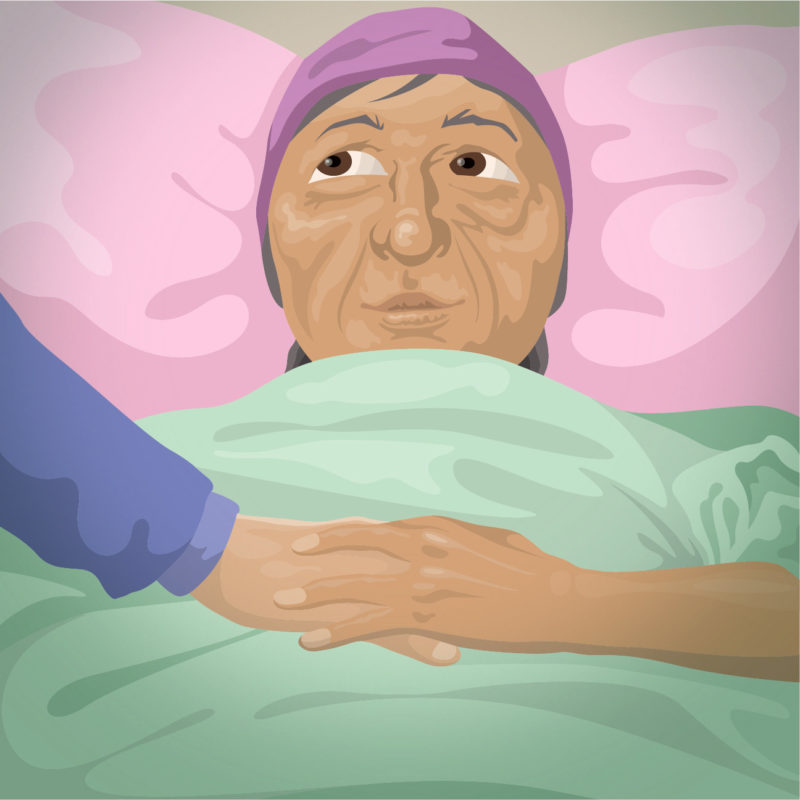
I returned in December 2017. I regretted that I had to reunite with my family under those circumstances. But at the same time it was a blessing to be able to take care of my mother, to accompany her during her chemotherapy sessions, having been away for so long. She told me that the best therapy was my presence.
I made it my task to go to the Venezuelan Institute of Social Security to collect her cancer medicines, but almost invariably I was told that there were none, just like the almost 600 people who went there at the time for the same reason. We, the relatives and patients, began to notice that some of the drugs that arrived there were actually distributed among the people, while the rest of it was sold on the black market.
So we organized and created the Oncology Patient Support Front. We held a meeting to choose the president, and it was me who was designated. On July 17, 2018, at a press conference, I reported on 25 cancer patients who had died because they had not received treatment. As I was leaving, I was approached by officers of the Bolivarian National Intelligence Service on a motorcycle. They put a hood on me and forced me inside a vehicle. Before they could take me, I shouted to some pals who were there with me to tell the people of Vente, the political party where I am a Human Rights coordinator in the state of Barinas, what was happening.
When they took my hood off, I was in a small room. They asked me for details of what I had said at the press conference in an interrogation that lasted about two hours. Maybe they were trying to scare me again. But I wasn’t afraid anymore. I’m not afraid anymore.
I’m still in Barinas. My mother died in May of 2018. My siblings, to whom I told what I had lived when I left, insisted that I not return to Caracas. So here is where I stayed. I continue with my work in Venezuela Free from Destitution. Every Saturday we hand out food and clothing to people and provide them with medical care. Because I don’t forget where God pulled me out from.
Traslation: Yazmine Livinalli
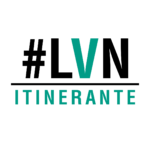
Note: This is a story of the Venezuelan website La vida de Nos. It is part of its project La vida de Nos Itinerante, which develops from storytelling workshops for journalists, human rights activists and photographers coming from 16 states of Venezuela.
1986 readings
I dedicate myself to social activism for the underprivileged. I also engage in political activism, even if I have never held public office.
Un Comentario sobre;